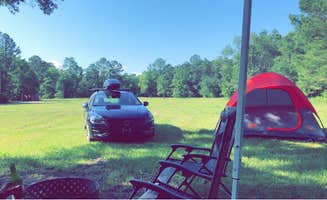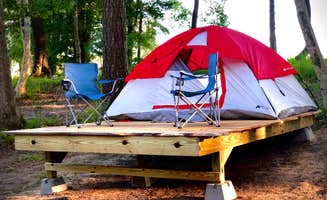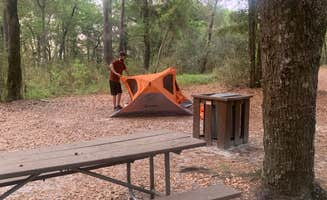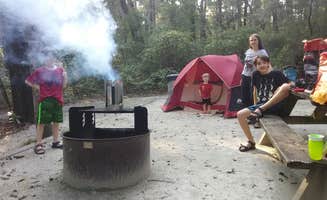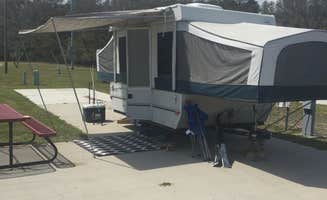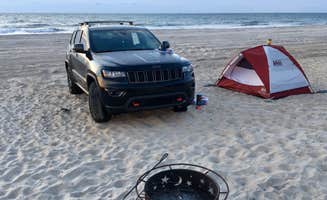Tent camping around Little River, South Carolina provides access to diverse waterfront settings within a subtropical climate zone. The region maintains warm temperatures much of the year with average summer highs reaching 90°F and winter lows rarely dropping below 35°F. Coastal campsites face occasional strong winds during storm systems, while inland river locations offer more sheltered conditions with higher humidity levels.
What to do
Swimming in shallow waters: Lake Waccamaw's beach area maintains extremely gradual depth, allowing swimmers to wade far from shore. According to a camper at Lake Waccamaw State Park Campground, "The lake is super shallow for at least a hundred yards in all directions from the dock."
Beach camping experience: Camp directly on the sand at beach access points from fall through spring. One visitor to Freeman Park noted, "Very nice to fall asleep to the sound of the crashing ocean waves and to wake up to the same. The sites were actually a bit larger than they sound online."
Night fishing: Several riverside campgrounds provide access for after-dark angling. At Freeman Park, overnight anglers are common: "We were almost alone, only one other vehicle. Two nice guys just there to night fish."
River paddling: Explore blackwater rivers with canoe and kayak rentals at several locations. A visitor to River Island Adventures mentioned, "This is a water adventure company that also has camping on the property. You can reserve a camp spot without signing up for any river activities, but camping does give you a little discount on activities."
What campers like
Privacy between sites: Princess Ann area provides well-separated tent sites with natural buffers. A camper at Princess Ann — Lumber River State Park shared: "Sites 7 & 8 would be perfect for two families to camp together, because they'd have the whole trail area to themselves."
Stargazing opportunities: Several campgrounds offer minimal light pollution. One camper at Princess Ann noted, "You can see tons of stars here at night, it is amazing! It's lovely to sit by the water and look at the night sky."
Wildlife viewing: The region's wetland ecosystems support diverse bird and animal populations. According to a visitor at Lake Waccamaw: "Bullfrogs, peepers, and owls called all night. Dragonflies galore flew about." Another camper at Princess Ann mentioned, "There's a lot of owls here at night. If you are a light sleeper you may want to consider ear plugs."
Water-based recreation: Many campgrounds center around waterfront activities. A reviewer at River Island Adventures shared: "They offer kayaking, paddleboarding, tubing, camping, glamping, night paddles with 6 different kinds of smores!! And the super cool Escape River Island which is 10 challenges."
What you should know
Significant hikes to campsites: Many walk-in tent sites require substantial hiking from parking areas. At Lake Waccamaw, a camper warned: "Sites 2-5 are a quarter mile plus from the parking area. I didn't read the key on the map, so that's my fault for not knowing."
Rustic toilet facilities: Bathroom quality varies significantly between locations. At Cypress Ranch Glamping, campers have access to basic toilet facilities, while a visitor to Freeman Park noted: "The amenities are pretty basic but it's all we need for camping!"
Tides impact beach camping: Waterfront sites may experience flooding. One Freeman Park visitor cautioned: "CRITICAL to be educated about beach weather and TIDES!!!! Super high tides were present during my visit. A high Queen tide came near the camp spots at night while a super high king tide COMPLETELY COVERED the camp sites in the morning!"
Variable maintenance: Site upkeep differs between campgrounds. A Lake Waccamaw visitor mentioned: "Our trash can was completely full. Our fire ring was full of ashes and the grate was jammed down. The previous campers had left us a few jugs of water but also small pieces of trash scattered about."
Tips for camping with families
Beach swimming safety: Lake areas provide safer swimming than ocean beaches for young children. A visitor noted about Lake Waccamaw: "The swimming dock is a short walk from campsite 1, but quite a hike from the other primitive group sites."
Military-only facilities: Some beachfront camping areas restrict access. One reviewer of Fort Fisher Air Force Recreation Area cautioned: "You need a DOD ID card to stay here. It is affordable if you qualify to stay. They will check and make you leave if you are not a card holder."
Off-peak beach camping: For quieter tent camping experiences with children near Little River, consider non-summer months. A Freeman Park camper advised: "During busy times you have to apply for or get a permit. It's very hot and busy during the summer but if you go in spring, fall or warm winter days it's absolutely amazing."
Bug preparation: Insect protection is essential for family comfort. A Lake Waccamaw camper recommended: "Bring mosquito netting or pop up to keep the horse flies away!"
Tips from RVers
Beach driving requirements: Four-wheel drive vehicles are mandatory for accessing some camping areas. A Freeman Park visitor advised: "First and foremost, make sure you know how to drive in the sand and what to do when your car gets stuck. It happened to us, as well as to many vehicles on the beach."
Hookup positioning challenges: RV site layouts may have inconvenient utility placements. At Fort Fisher, a camper observed: "The sites themselves are extremely long, but for some reason the hook-ups are all near the front of the site, so you can't take advantage of the length."
Check-in logistics: Some campgrounds have complicated arrival procedures. A Fort Fisher visitor recommended: "The check-in office is further down towards the river with no real place to turn-around, so I recommend calling ahead to know your site, unhook, then drive to check-in."


